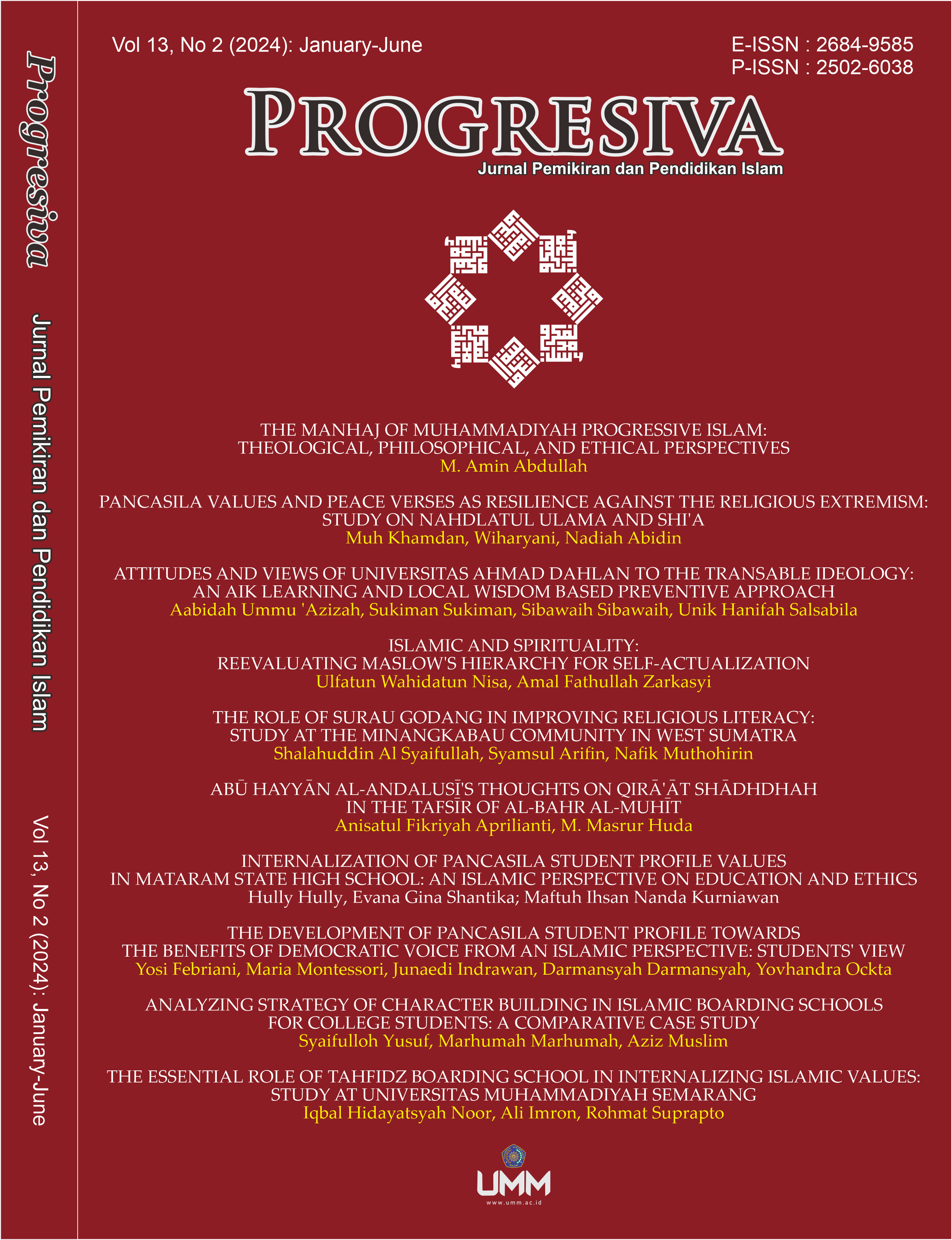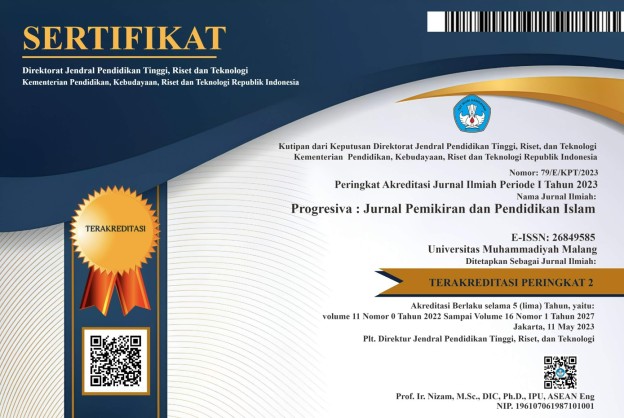Pancasila Values and Peace Verses as Resilience Against the Religious Extremism: Study on Nahdlatul Ulama and Shi'a
DOI:
https://doi.org/10.22219/progresiva.v13i02.32778Keywords:
Identity, Ideology, Contestation, Peace, TerrorismAbstract
The article explains the contestation and commodification of ideology in changing patterns of extremist movements in society. Ideological problems are studied using a political sociology approach to describe the relationship between Pancasila values and peaceful verses in Islam with the phenomenon of changing movement patterns of terrorist networks in Indonesia. This paper uses a qualitative method that explains the data descriptively so that the construction of the data is understood as the result of interpretations that have plural dimensions or depend on the analytical point of view. The primary sources for this research are documents related to the themes of Pancasila values and peaceful verses in the Koran and patterns of building immunity against extremism. The data processing process based on some documents was carried out using the content analysis method using the descriptive analysis method. Ideological identity in contestation in Indonesia is only one of the differentiation strategies to win public sympathy. Identity politics, which is often associated with radicalism and fighting between religious groups, is different from what happens in politics in other countries. The phenomenon of the life of the Nahdlatul Ulama and Shi'a community in Jepara, which tends to be peaceful and quick in resolving conflicts based on religious ideology, is at least influenced by awareness of the values of Pancasila as a common consensus.
Downloads
References
Abubakar, R. (2020). Pergulatan Syi’ah Dalam Konstelasi Politik Keagamaan di Indonesia. SUKA Press UIN Sunan Kalijaga.
Achfandhy, M. I., Pujianto, W. T., Daniyarti, W. D., & Jamiah, R. (2024). The Pre-Presidential Election 2024: Uncovering the Consistency of Religious Politicization. Jurnal Ilmiah Islam Futura, 24(1), 67. https://doi.org/10.22373/jiif.v24i1.17103
Adnan, R. S. (2023). The Dynamic Role of Moslem in Building Indonesia as a Nation-State. Indonesian Journal of Religion and Society, 5(1), 58–69. https://doi.org/10.36256/ijrs.v5i1.339
Amaliyah, E. I. (2015). Harmoni di Banjaran: Interaksi Sunni-Syiah. Harmoni, 14(2), 81–96.
Arif, M. K. (2022). Concepts of Religion and Religious Flows (Study of Epistemology and Theory of Religion and the Heresy of the Shi’i Sect) In the View of Islam Ahlu Sunnah Wal Jama’ah). Al-Risalah, 13(2), 408–430. https://doi.org/ 10.34005/alrisalah.v13i1.1938
Ashar, A., Sultan, L. S., Rahim, A., & Rahman, A. (2020). The Factors Causing The Emerging of Transactional Politics in The Local Election in East Kalimantan 2005 From The Perspective of Siyasah Syar’iyyah. AL-’ADALAH, 17(1), 97–110. https://doi.org/10.24042/adalah.v17i1.6633
Badrun, B., Sujadi, S., Warsah, I., Muttaqin, I., & Morganna, R. (2023). Pancasila, Islam, and Harmonising Sociocultural Conflict in Indonesia. Al-Jami’ah: Journal of Islamic Studies, 61(1), 137–156. https://doi.org/10.14421/ajis.2023.611.137-156
Buciu, L. (2021). Al Qaeda and Hyperterrorism – The Successful Emergence of Binladenism at Global Level. STRATEGIES XXI - Security and Defense Faculty, 17(1), 74–79. https://doi.org/10.53477/2668-2001-21-08
Budi, M. F. E. S. (2022). The Role of Kyai, Santri, and Nasional (Abangan) in Political Identity Struggle: a Case Study. International Journal Religious and Cultural Studies, 4(2), 145–156. https://doi.org/10.34199/ijracs.2022.10.02
Burdah, I. (2023). Growing Exclusion of The Majority: The “Triumph of Wahhabism” and Its Threat to Indonesian Islam in the Democratic Society. Journal of Indonesian Islam, 17(1), 54. https://doi.org/10.15642/JIIS.2023.17.1.54-75
Dauda, K. O. (2020). Islamophobia and Religious Intolerance: Threats to Global Peace and Harmonious Co-Existence. QIJIS (Qudus International Journal of Islamic Studies), 8(2), 257. https://doi.org/10.21043/qijis.v8i2.6811
Driss, H. Ben. (2020). Global Epistemic Injustice: An Ethical Confrontation With Jihadism. Journal of Contemporary Issues in Education (JCIE), 15(2), 23–35. https://doi.org/10.20355/jcie29404
Finnemore, M., & Jurkovich, M. (2020). The Politics of Aspiration. International Studies Quarterly, 64(4), 759–769. https://doi.org/10.1093/isq/sqaa052
Fitriani, A. S. P. P. N. S. (2018). The Current State of Terrorism in Indonesia: Vulnerable Groups, Networks, and Responses. Centre for Strategic and International Studies (CSIS).
Fulginiti, A., Goldbach, J. T., Mamey, M. R., Rusow, J., Srivastava, A., Rhoades, H., Schrager, S. M., Bond, D. W., & Marshal, M. P. (2020). Integrating Minority Stress Theory and the Interpersonal Theory of Suicide among Sexual Minority Youth Who Engage Crisis Services. Suicide and Life-Threatening Behavior, 50(3), 601–616. https://doi.org/10.1111/sltb.12623
Haas, M. L. (2021). When Do Ideological Enemies Ally? International Security, 46(1), 104–146. https://doi.org/10.1162/isec_a_00413
Kahin, G. M. T. (1972). Nationalism and Revolution in Indonesia. Cornell University Press.
Kaloeti, D. V. S., & Ardhiani, L. N. (2020). The effect of self-esteem, attitude towards the body, and eating habit on cognitive reactivity. Psikohumaniora: Jurnal Penelitian Psikologi, 5(1), 57. https://doi.org/10.21580/pjpp.v5i1.4561
Khamdan, M. (2015). Bina Damai Terorisme (1st ed.). Penerbit Parist.
Khamdan, M. (2016a). Pengembangan Bina Damai dalam Penanganan Tindak Pidana Terorisme di Indonesia. Jurnal Cita Hukum, 4(1), 105–132. https://doi.org/10.15408/jch.v4i1.2835.2016.4.1.
Khamdan, M. (2018). Islam Nusantara in Political Contestation Identity Religion in Indonesia. Agustus 2018 ADDIN, 12(2). https://dx.doi.org/10.21043/addin.v12i2.4774
Khamdan, M. (2022). Politik Identitas dan Perebutan Hegemoni Kuasa: Kontestasi dalam Politik Elektoral di Indonesia (Wiharyani, Ed.; 1st ed.). Penerbit A-Empat.
Khamdan, M. (2024). Sinergi Masyarakat Sipil Dalam Menghadapi Pergeseran Pola Gerakan Terorisme di Indonesia. Toleransi, 16(1), 1–12. https://dx.doi.org/10.24014/trs.v16i1.29046
Khamdan, Muh. (2016b). Pengembangan Nasionalisme Keagamaan Sebagai Strategi Penanganan Potensi Radikalisme Islam Transnasional. ADDIN, 10(1), 207. https://doi.org/10.21043/addin.v10i1.1135
Latif, Y. (2011). Negara Paripurna: Historisitas, Rasionalitas, dan Aktualisasi Pancasila. Gramedia Pustaka Utama.
Magill, K. R., Scholten, N., Blevins, B., & Smith, V. D. (2024). The importance of civic culture: Toward intellectual solidarity and community agency. Education, Citizenship and Social Justice, 19(1), 139–161. https://doi.org/10.1177/17461979221130431
Miftahuddin, & Widiyanta, D. (2021). Dinamika Perjuangan Badan Federasi Umat Islam Menuju Kemerdekaan Indonesia, 1937-1945. Istoria Jurnal Pendidikan dan Sejarah, 17(2), 1–18. https://doi.org/10.21831/istoria.v17i2.44999
Porta, D. D. R. M. (2021). Transnational Activisms and the Global Justice Movement. Routledge.
Portmann, L. (2022). Do Stereotypes Explain Discrimination Against Minority Candidates or Discrimination in Favor of Majority Candidates? British Journal of Political Science, 52(2), 501–519. https://doi.org/10.1017/S0007123420000800
Prajoko, R., Pradhanawati, A., Fitriyah, F., & Sardini, N. H. (2024). Hegemony of Political Parties and Regional Political Oligarchy. Khazanah Sosial, 6(1), 71–83. https://doi.org/10.15575/ks.v6i1.34121
Saefudin, A. ; A. M. (2021). Internalization of Multicultural-Based Islamic Education: Sunni-Shi’i Synergy in Banjaran Bangsri Village Jepara. Edukasia Jurnal Penelitian Pendidikan Islam, 16(1), 37–56. https://doi.org/ 10.21043/edukasia.v16i1.880
Siregar, S. N., Noor, F., & Romli, L. (2022). Socialism And Nationalism: A Comparison between the Thought of H.O.S. Tjokroaminoto and Alimin Prawirodirjo. Akademika : Jurnal Pemikiran Islam, 27(1), 101. https://doi.org/10.32332/akademika.v27i1.4797
Sulianti, A., Safitri, R. M., & Gunawan, Y. (2019). Implementasi Pendidikan Kewarganegaraan Berbasis Kearifan Lokal dalam Membangun Karakter Generasi Muda Bangsa. Integralistik, 30(2), 100–106. https://doi.org/10.15294/integralistik.v30i2.20871
Tabroni, R., & Idham, I. (2023). From Radical Labels to Moderate Islam: The Transformation of the Salafism Movement in Jakarta. Indonesian Journal of Islam and Muslim Societies, 13(2), 279–306. https://doi.org/10.18326/ijims.v13i2.279-306
Wardi, Moh., Fithriyyah, M. U., Z, F., Hidayat, T., Ismail, I., & Supandi, S. (2023). Implementation of Religious Moderation Values through Strengthening Diversity Tolerance in Madrasah. Jurnal Pendidikan Islam, 9(2), 241–254. https://doi.org/10.15575/jpi.v9i2.27952
Wiharyani, Mustofa, M., & Fata, A. K. (2023). Hate Speech and Identity Crystallization in Indonesia’s Cyberpolitics: Peace-Making Criminology Approach. Hong Kong Journal of Social Sciences, 60(No. 60 Autumn/Winter 2022). https://doi.org/10.55463/hkjss.issn.1021-3619.60.10
Zainuddin, Efendi, R. E., Mirdad, J., & Yaacob, S. E. (2022). Siyāsah Shar’iyyah and the Politicization of Religion in the 2019 Indonesian Presidential Election. Ahkam, 22(2), 357–384. https://doi.org/10.15408/ajis.v22i2.28165
Zulkifli. (2024). What Drives Anti-Shi’i Framing in Indonesia? Studia Islamika, 31(1). https://doi.org/10.36712/sdi.v31i1.27713
Downloads
Published
How to Cite
Issue
Section
License
Copyright (c) 2024 Muh Khamdan, Wiharyani, Nadiah Abidin

This work is licensed under a Creative Commons Attribution-ShareAlike 4.0 International License.


















